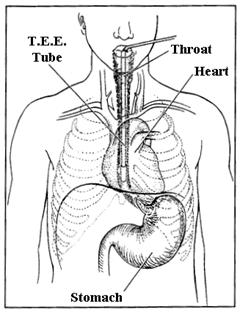
A Transesophageal Echocardiogram (T.E.E.) is a special ultrasound picture of your heart. The ultrasound beam is on the end of a flexible tube, which is placed down your throat.
Your physician will explain why this test is needed for your medical treatment. This procedure is done in the office and you will recover in a special room where the procedure is done.
Before the test:
- Do not eat or drink after midnight on the day of the procedure.
- If the doctor tells you to take your medications, they should be taken with a few sips of water.
- You will have an IV (intravenous) site started.
- You will be asked to remove your dentures and/or partial plates if you wear any.
- The physician will numb your throat with a special spray.
- You will receive a fast acting IV sedative to help you relax during the tests.
During the test:
- Your physician will ask you to swallow, to help in passing the probe.
- Pictures of your heart will be made and recorded on videotape.
- Your blood pressure, heart rhythm, oxygen level and breathing will be carefully monitored.
After the test:
- You will be monitored closely until you’re more awake and alert. You may still be drowsy for a few hours after the test.
- You will not be able to eat or drink anything for at least 1-2 hours after the test. The numbness in your throat should be gone before you take anything by mouth. Then you should start by having ice chips and liquids. If you tolerate those well, you may progress to solid foods.
- You should ask your nurse for help in getting out of bed the first time. You may still be somewhat dizzy or weak for a few hours after the test (because of the sedation).
- Your physician will provide information about the test results as soon as they are complete.
- You may experience a slight sore throat for two to four hours after the effects of the medication are gone. Drinking warm fluids will usually help relieve a sore throat.
- You will be returned to your room, or allowed to go home with another responsible adult driving.
